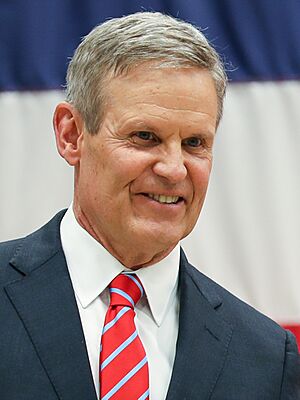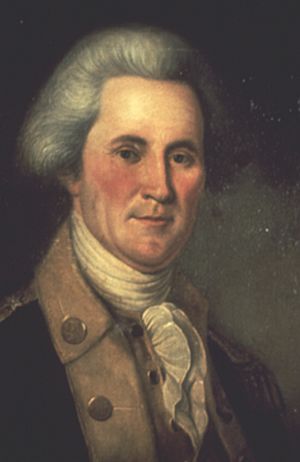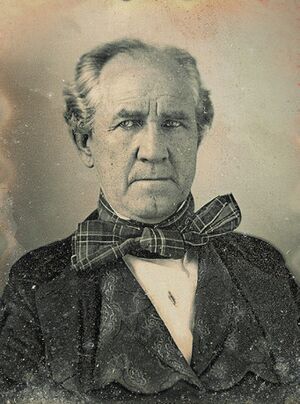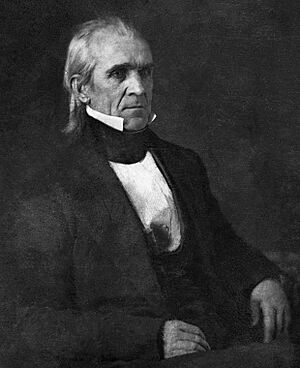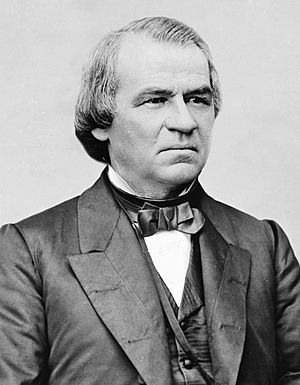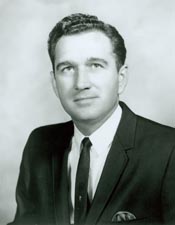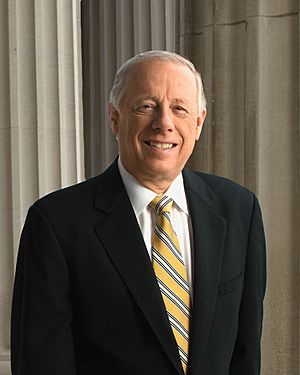Governor of Tennessee facts for kids
Quick facts for kids Governor of Tennessee |
|
|---|---|

Flag of the governor
|
|

|
|
| Government of Tennessee | |
| Style |
|
| Residence | Tennessee Governor's Mansion |
| Term length | Four years, renewable once consecutively |
| Constituting instrument | Tennessee Constitution of 1796 |
| Inaugural holder | John Sevier |
| Formation | March 30, 1796 |
| Succession | Line of succession |
| Deputy | Lieutenant Governor of Tennessee (The Speaker of the Senate holds the title and succession) |
| Salary | $204,336 (2022) |
The governor of Tennessee is the main leader of the U.S. state of Tennessee. They are like the "boss" of the state government. The governor is also the commander of Tennessee's military forces. This person is the only state official chosen directly by voters from all over Tennessee.
The current governor is Bill Lee. He is a member of the Republican Party. Governor Lee started his first term on January 19, 2019. He is the 50th governor of Tennessee. He was re-elected for a second term in 2022.
Contents
Becoming Governor
The Tennessee Constitution sets rules for who can be governor. A person must be at least 30 years old. They also need to have lived in Tennessee for at least seven years before the election.
The governor serves a four-year term. They can serve only two terms in a row. Only two other U.S. states, New Jersey and Hawaii, elect just their governor statewide.
What the Governor Does
The Tennessee Constitution says that the governor has the "supreme executive power." This means the governor is in charge of running the state. They appoint many people to lead state departments and serve on important boards.
The governor is the leader of Tennessee's National Guard and state militia. This is true unless these forces are called to serve the national government. The governor also leads the Tennessee Board of Regents and the University of Tennessee's Board of Trustees. They also have seats on several other state boards.
Veto Power
The Constitution gives the governor the power to veto (reject) laws passed by the Tennessee General Assembly. They can also reject specific spending items in bills. If the governor vetoes a law, the legislature can still make it a law. They need a simple majority vote in both houses to override the veto. If the governor vetoes a bill after the legislature has finished its session, the veto stands. Governors in Tennessee do not often use their veto power. This is because it is easy for the General Assembly to override it.
The governor can also call the General Assembly together for special meetings. These meetings focus only on topics the governor chooses.
Choosing Judges
In Tennessee, the governor appoints judges to state and local courts. This process is called the Tennessee Plan. First, a special group checks the nominees. Then, the governor appoints them. After their first term, judges must run in a special election. This election decides if they will serve another term.
Cabinet Appointments
The Tennessee Governor's Cabinet helps the governor run the state. It includes seven key staff members and 23 Executive Departments. Key staff members include the Chief of Staff and Communications Director. The Executive Department cabinet has Commissioners for areas like Agriculture, Education, and Health.
Most of these positions are chosen by the governor. However, some roles, like the secretary of state and attorney general, are chosen by statewide elections.
Before becoming governor, Bill Lee announced some of his first appointments. These included leaders for the Department of Military and the Department of Veterans Services. He also named new leaders for the Departments of Health, Developmental Disability, and General Services. Governor Lee also launched a website for Tennesseans to apply for jobs in his administration.
State of the State Address
The Tennessee Constitution says the governor should tell the General Assembly how the state is doing. They should also suggest new ideas for laws.
The State of the State address usually happens in January. It is given at the start of the General Assembly's session. In this speech, the governor shares their main goals and plans for new laws. This is especially true for a new governor.
For example, in 2019, Governor Bill Lee talked about adding money to the state's "rainy day fund." This fund saves money for unexpected needs. He said:
"As our state continues to grow, we are committed to remaining among the most fiscally sound and best managed states in America. We live in prosperous days, but it's precisely during these times when we must build up our storehouses for when times may not be as good. For that reason, I am particularly proud of this: in my budget, we are making the largest single contribution to our Rainy Day Fund in the state's history. When this budget is implemented, our Rainy Day Fund will be $1.1 billion – the largest it has ever been in both real dollars and as a percentage of our overall revenue."
When a governor is leaving office, their last speech often highlights their achievements. For example, Bill Haslam in 2018 spoke about job growth, more money for schools, and high school graduation rates during his time as governor.
Governor's Pay
As of 2022, the governor's salary was $204,336 per year. This is one of the highest governor salaries in the U.S. However, some past governors, like Bill Haslam and Phil Bredesen, were already wealthy. They chose not to take a salary for their service.
Who Takes Over?
Tennessee does not elect a separate lieutenant governor. If the governor leaves office early (due to death, removal, or resignation), the Speaker of the Tennessee Senate becomes governor. Because of this, the Speaker is often called the "lieutenant governor."
After the Speaker of the Senate, the next in line are:
- The speaker of the Tennessee House of Representatives
- The secretary of state
- The comptroller
If the governor's office becomes empty in the first 18 months of their term, a special election is held. This election fills the rest of the term. If it happens after 18 months, the person who takes over serves the rest of the term. A partial term still counts towards the two-term limit.
Famous Governors
Tennessee has had many important governors throughout its history.
John Sevier
John Sevier was Tennessee's very first governor. He helped create the state and dealt with many challenges that came with it. His work shaped early Tennessee politics. He was a member of the Democratic-Republican Party.
Sam Houston
Sam Houston served in the U.S. House of Representatives for Tennessee. He was then elected the 6th Governor of Tennessee, serving from 1827 to 1829. After his time as governor, he moved west to Texas. He became a key leader in the Texas Revolution. Houston led the Texian Army to victory against Mexico. He was then elected the first and third President of Texas. He helped Texas join the United States. Later, he represented Texas in the U.S. Senate. He also became the 7th Governor of Texas. This made him the only person to be governor of two different U.S. states. The city of Houston is named after him.
James K. Polk
James K. Polk was the 11th President of the United States. Before that, he was the governor of Tennessee from 1839 to 1841. He was a Democrat. He strongly believed in the ideas of Andrew Jackson.
Andrew Johnson
Andrew Johnson became the 17th President of the United States after Abraham Lincoln's assassination. He was a Democrat. He had served as governor of Tennessee from 1853 to 1857. At that time, the Tennessee governor did not have many powers. Johnson used the position to share his ideas with the public.
Ray Blanton
Ray Blanton was governor from 1975 to 1979. He left office a few days early. This happened because leaders from his own party wanted to start the next governor's term sooner.
Phil Bredesen
Phil Bredesen, a Democrat, was governor from 2003 to 2011. He also served as mayor of Nashville. Governor Bredesen worked to increase the "Rainy Day fund." He also passed balanced budgets and expanded pre-kindergarten programs. He proposed "Cover Tennessee," a health care plan. This plan aimed to help adults buy affordable insurance. It also included "Cover Kids," which helps pregnant women and children from low-income families get health services.
Bill Haslam
Bill Haslam, a Republican, was governor from 2011 to 2018. He took office during a tough economic time. He focused on helping Tennessee's economy recover. He worked to make the state more friendly for businesses. His biggest impact was in education. He is known for the TN Promise and Reconnect Programs. These programs allow students to attend community college for two years with free tuition. This helped improve the workforce in Tennessee.
What Governors Focus On
In recent years, Tennessee governors have focused on the economy, health care, and education. Governors like Haslam worked to make the state business-friendly. They used ideas that save money when making policies. Even Democratic governors, like Phil Bredesen, have supported some conservative ideas.
Bredesen's focus included health care. He launched Cover Tennessee in 2006. This program aimed to help adults get affordable health insurance. It also helped children and pregnant women in low-income families.
Tennessee governors have often switched between Democrats and Republicans. However, the state is now mostly Republican.
Governor Achievements
Tennessee governors' achievements often depend on what their administration cares about most. Since Governor Haslam, there has been a big focus on education. They want more students to go to technical and community colleges. Bill Lee has continued this goal. He has suggested more money for school safety. Both Democratic and Republican governors believe that a balanced budget is very important for Tennessee.
Governor Sundquist served from 1995 to 2003. He focused on government ethics and welfare reforms. He helped create the Families First Act. This act reduced the number of people receiving welfare to save state money. Sundquist also created the Department of Children's Services. In his second term, he started the ConnectTn program. This program made Tennessee the first state to offer internet access in public libraries and schools.
Phil Bredesen wanted to reduce waste in state government. He also aimed to improve schools. In 2004, Bredesen changed the TennCare program. He cut its budget and removed many people from the program. However, he increased money for education. He focused on pre-kindergarten and raising teacher pay. In 2006, Bredesen created Cover Tennessee. This program helped people with existing health conditions. It also expanded care for uninsured children.
The Haslam administration worked hard to improve Tennessee's economy and education. In 2012, Haslam signed a budget to increase construction spending. He also removed the inheritance and gift tax. His "Fast Track" plan offered reasons for companies to move to Tennessee. Haslam's most famous achievements are the Tennessee Promise and Reconnect programs. Tennessee Promise gives two free years of community college or technical school. The Reconnect program helps adults go back to college. In 2017, Haslam introduced the IMPROVE Act. This act aimed to fund road construction. It cut food sales taxes but raised taxes on gas and natural gas.
Timeline
| Timeline of Tennessee governors |
 |
See Also
- Lieutenant Governor of Tennessee
- Tennessee Secretary of State
- Comptroller of the Treasury of Tennessee
- Government of Tennessee
 | Isaac Myers |
 | D. Hamilton Jackson |
 | A. Philip Randolph |


